1953 Chevy Bel Air - Rob Fortier
Traditional Kustom Hot Rod and Vintage Culture and design :: Mild & radical Custom cars database :: Chevrolet
Page 1 sur 1
 1953 Chevy Bel Air - Rob Fortier
1953 Chevy Bel Air - Rob Fortier
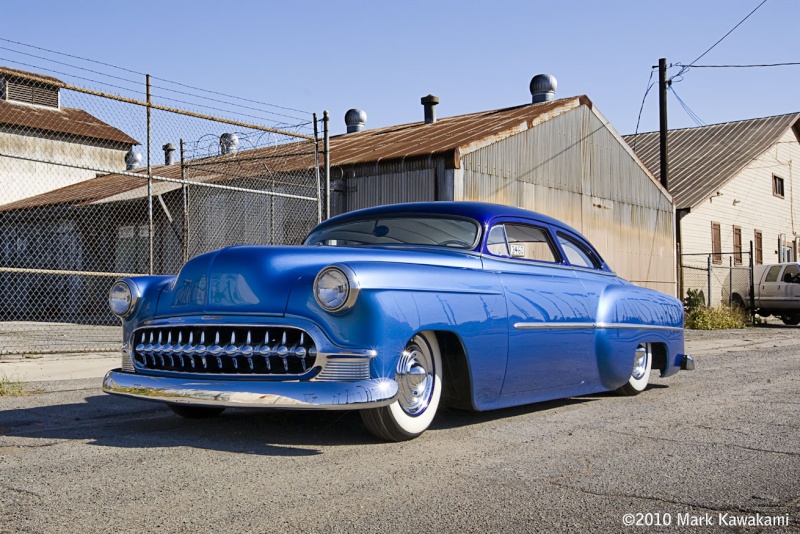
I have known about Rob Fortier's 53 Chevy Bel Air for awhile and had always wanted to take photos of it. Last month at the Hippy Killer Hoedown I saw it for the first time. During that week I kept thinking about it so I contacted Nelson Kanno to see if he could hook me up with Rob to possibly shoot it.

Nelson got a hold of Rob and got right back to me. "If you want to shoot it you better call him right away!" Turns out Rob had sold the car and it was being picked up at the end of the week. So it was a good thing I decided to call when I did else I would have been shit out of luck. Rob told me that Friday would be good cause he would be at home cleaning it up getting it ready for Saturday pick up.
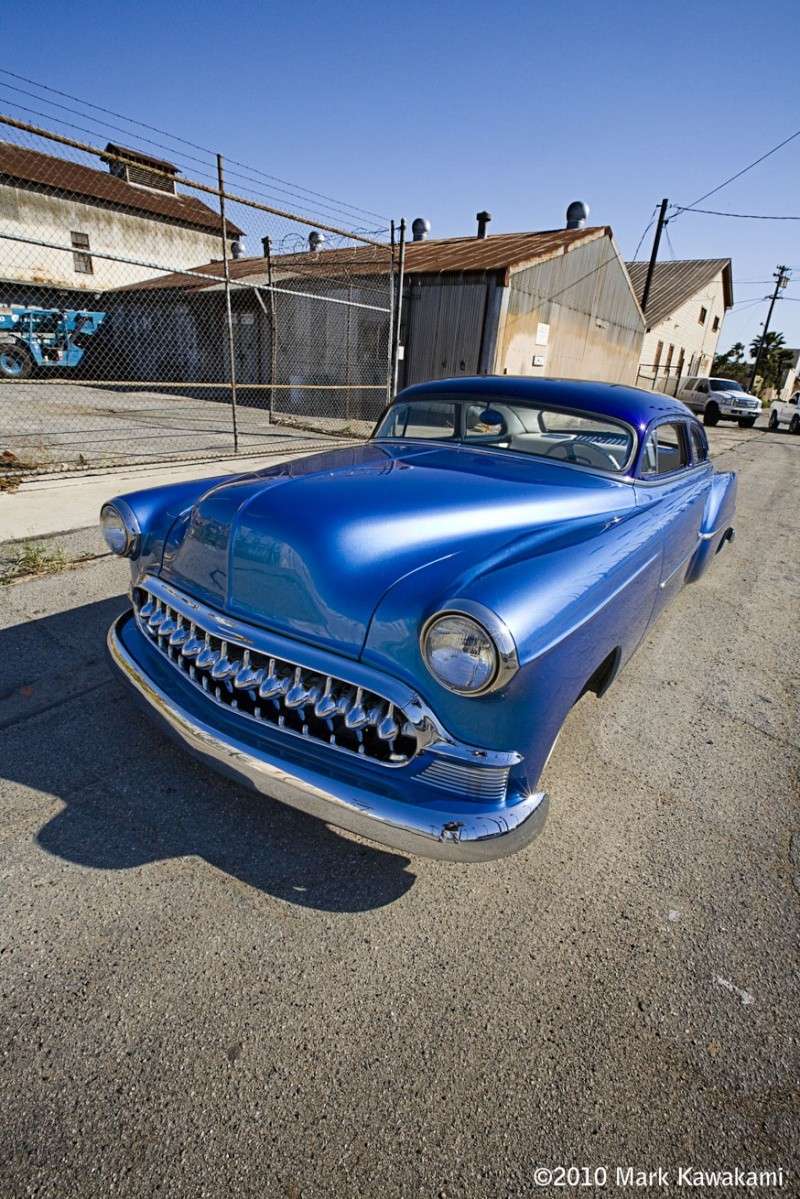
So on that Friday I hopped on the 91 Freeway to drive out to Riverside to meet him. We drove around downtown Riverside and scouted out some spots and found a few places to shoot. After I got some shots of the car we went to AppleBees to have some food and talk.
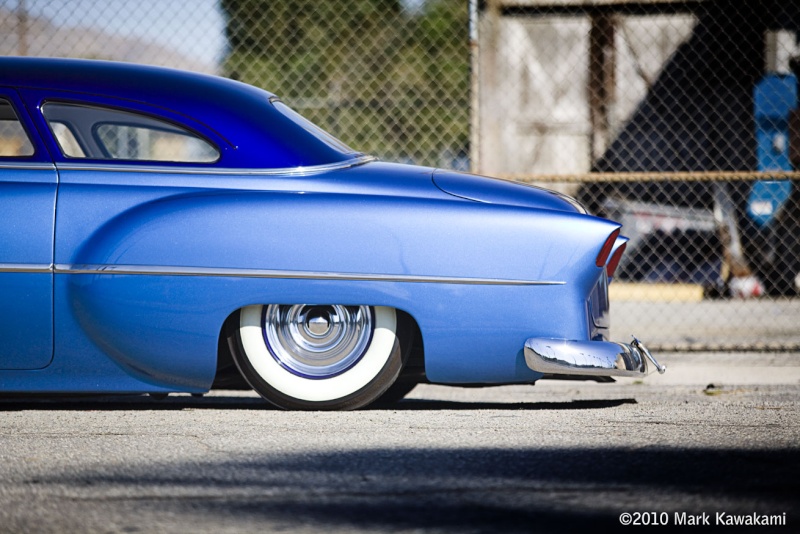
The sun was going down and I wanted to get some last shots of the car with the prime lighting conditions. The following interview and photos is what I got with my day with Rob Fortier. Super nice guy and a great car that ranks as one of nicest ones I've seen.
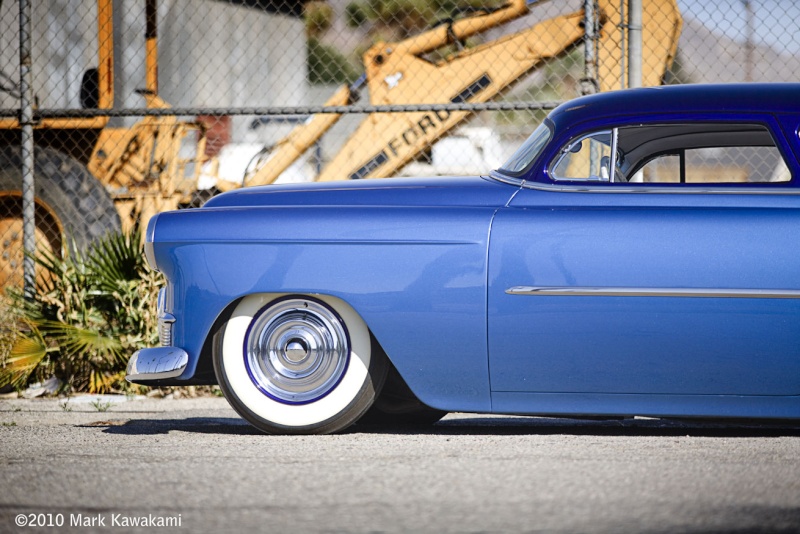
Dernière édition par Predicta le Dim 29 Mar - 10:50, édité 1 fois
_________________
We don't care the People Says , Rock 'n' roll is here to stay - Danny & the Juniors - 1958
 Re: 1953 Chevy Bel Air - Rob Fortier
Re: 1953 Chevy Bel Air - Rob Fortier
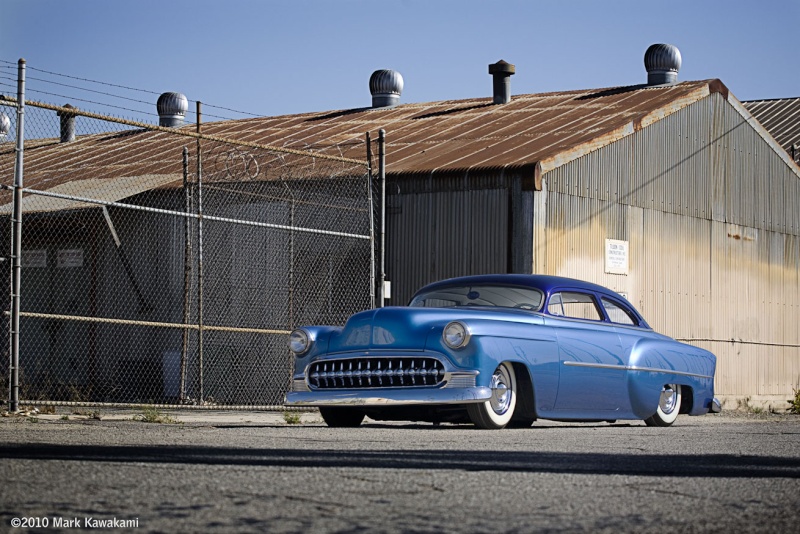
Joyrides Art Co: What year and make is your car?
Rob: It’s a 1953 Chevy Bel Air.
JAC: How long have you had the car?
Rob: I have had the car since 2003.
JAC: Where did you find the car?
Rob: I’ve known about the car since the early '90s. A friend of Cole Foster’s built it, Todd Gravelle and I’d seen the car in Salinas before it had a roof on it. Yeah, it was in the garage and I saw it and the next year in Paso Robles where he had the car there with the roof on and yellow primer. Never forgot the car. You know it wasn’t stunning or anything but it stood out in my mind. So in 2003, Cole called me and told me the car was for sale. It was a car Todd would never sell but he needed money at the time. Cole told me he wanted to sell it to his friend in Italy so he could make some money, but since he knew how much I wanted it he gave me first shot at it. So fuck it, it’s my car. I called Todd, made a deal for it, flew up there, drove it home and finished it.
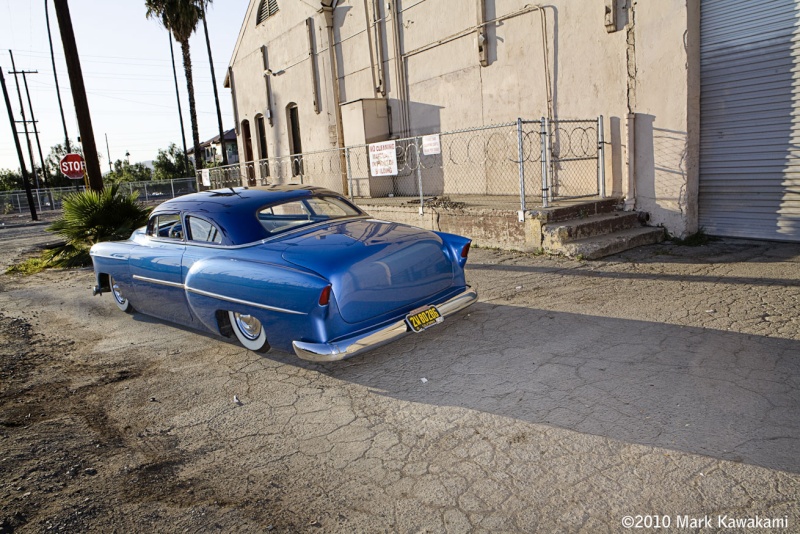
_________________
We don't care the People Says , Rock 'n' roll is here to stay - Danny & the Juniors - 1958
 Re: 1953 Chevy Bel Air - Rob Fortier
Re: 1953 Chevy Bel Air - Rob Fortier
JAC: What condition was the car in when you got it?
Rob: It was a driver. Just primered. Body work was done, no interior, no chrome except for the grill, no glass. Just needed attention to the details. Finish body work, needed paint, chrome, interior and everything else. Todd did a lot of the suspension work and the drive train.
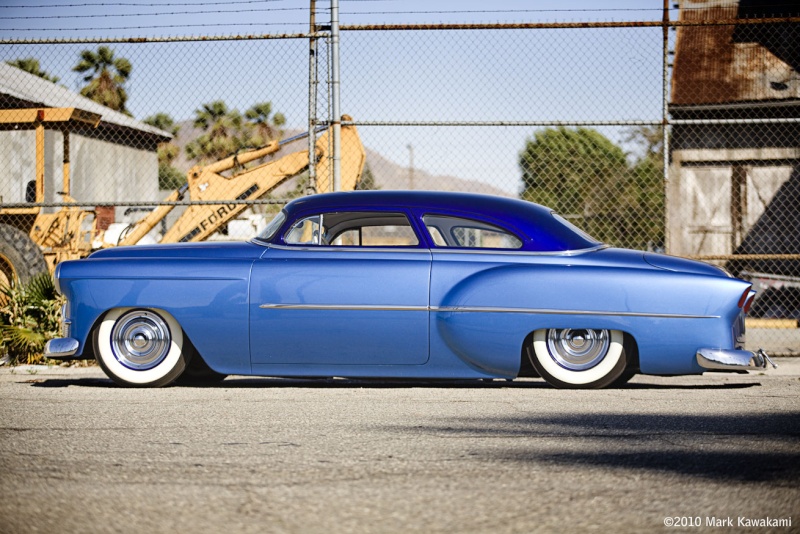
JAC: What modifications did you do the car?
Rob: Modification. Nothing that was already modified to the car. Todd did an amazing job. Exterior wise it’s just how you see it. The way he chopped it. He didn’t french the headlights so I left them unfrenched. Taillights are from a 56 Buick. Everything he did I just left it as is, but I changed some of the suspension. It’s got a generic small block Chevy 350. It had a turbo 350 transmission when I bought it, but I switched it to a 4-speed overdrive. Just so I can drive it on the freeway better. I tend to drive a little fast. The other transmission wasn’t good for that. The rear end is the same one off a 56 Chevy Bel Air. It has air bags in the back, but it just has those Shock Waves. It’s got a full blown Kenwood stereo. It was another freebie. I worked a package deal for Kenwood and they comped everything for it. A guy named Alan Hickman who owns Audio Shoppe nearby, did the install. Real nice guy. It’s got a DVD player that I never used once. My kid always wants to watch videos, but I keep forgetting to bring one. The hubcaps. Everyone asks me what the hub caps are. I don’t know. Todd doesn’t know. Cole doesn’t know. Pontiac of some era. Cole used to run those hub caps on his car, but when Todd sold the car he had to give them back. The word on it is that they’re Pontiacs. The steering wheel is actually out of Jason Jessee’s truck. I sent it to a place in Australia called, Pearlcraft. They did it and made it the mother of pearl it is now, but it’s originally a 49 Chevy accessory wheel. They won’t tell me how they do it or what it is. It’s their ancient Chinese secret.
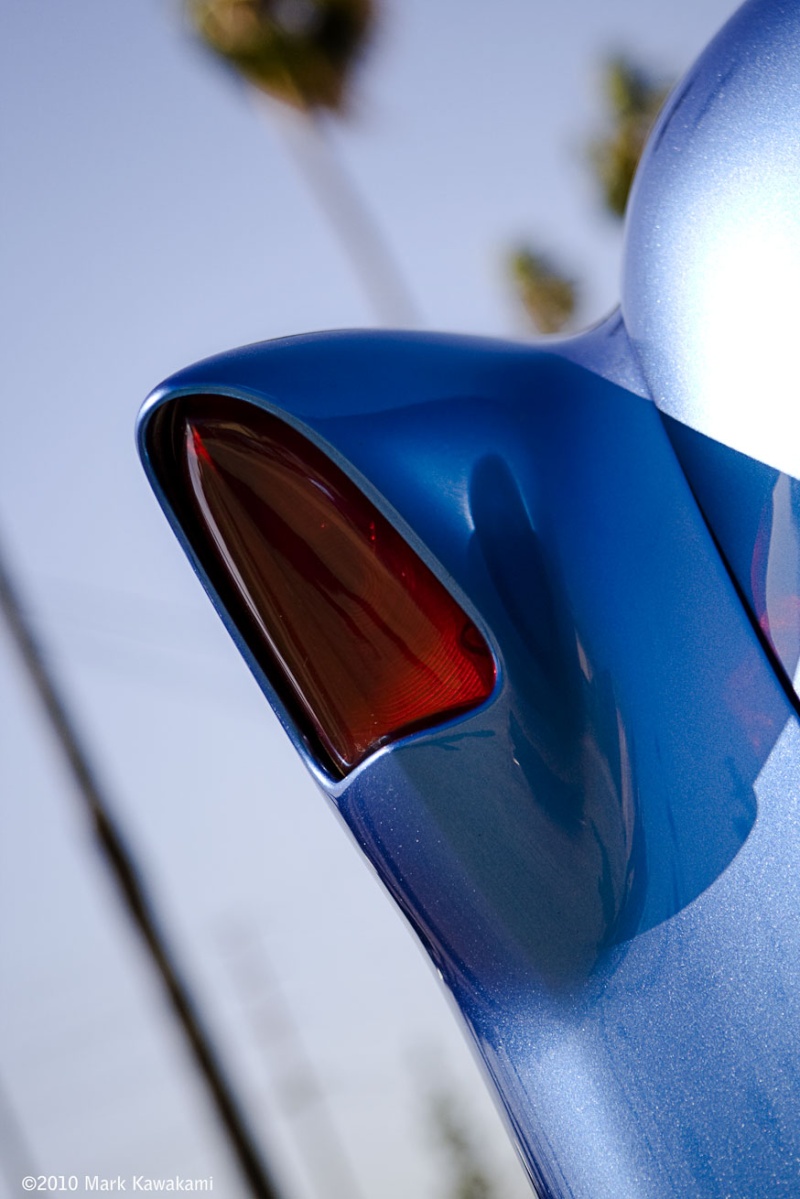
JAC: How long did it take to finish the car?
Rob: Well, Todd had it for 10 years in the same condidtion. So about 15 years with Todd and myself involved.
JAC: Who painted it?
Rob: His name is Andre Carey. He’s up in Eureka, California. He’s the guy that painted a couple of cars for Kutty’s dad. Somehow we crossed paths. He told me, “ I want to paint your car” and I said the only obstacle we have is your in Eureka and I’m down here (Riverside). He’s tells me,”Well I’m taking a car to the Barrett-Jackson auction in Scottsdale. If I sell it, I have the trailer, so I’ll come by and pick up the car and paint it for you.” So I kept my fingers crossed and he sold the car. So he got mine and painted it. I had to do a story on it in the magazine. That’s how I paid for his labor, but it didn’t cost me any money beside the paint itself.
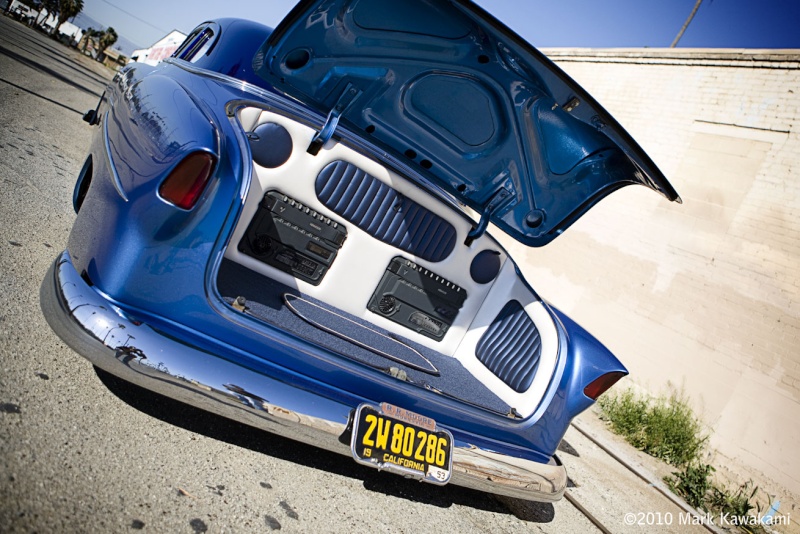
Rob: It was a driver. Just primered. Body work was done, no interior, no chrome except for the grill, no glass. Just needed attention to the details. Finish body work, needed paint, chrome, interior and everything else. Todd did a lot of the suspension work and the drive train.

JAC: What modifications did you do the car?
Rob: Modification. Nothing that was already modified to the car. Todd did an amazing job. Exterior wise it’s just how you see it. The way he chopped it. He didn’t french the headlights so I left them unfrenched. Taillights are from a 56 Buick. Everything he did I just left it as is, but I changed some of the suspension. It’s got a generic small block Chevy 350. It had a turbo 350 transmission when I bought it, but I switched it to a 4-speed overdrive. Just so I can drive it on the freeway better. I tend to drive a little fast. The other transmission wasn’t good for that. The rear end is the same one off a 56 Chevy Bel Air. It has air bags in the back, but it just has those Shock Waves. It’s got a full blown Kenwood stereo. It was another freebie. I worked a package deal for Kenwood and they comped everything for it. A guy named Alan Hickman who owns Audio Shoppe nearby, did the install. Real nice guy. It’s got a DVD player that I never used once. My kid always wants to watch videos, but I keep forgetting to bring one. The hubcaps. Everyone asks me what the hub caps are. I don’t know. Todd doesn’t know. Cole doesn’t know. Pontiac of some era. Cole used to run those hub caps on his car, but when Todd sold the car he had to give them back. The word on it is that they’re Pontiacs. The steering wheel is actually out of Jason Jessee’s truck. I sent it to a place in Australia called, Pearlcraft. They did it and made it the mother of pearl it is now, but it’s originally a 49 Chevy accessory wheel. They won’t tell me how they do it or what it is. It’s their ancient Chinese secret.

JAC: How long did it take to finish the car?
Rob: Well, Todd had it for 10 years in the same condidtion. So about 15 years with Todd and myself involved.
JAC: Who painted it?
Rob: His name is Andre Carey. He’s up in Eureka, California. He’s the guy that painted a couple of cars for Kutty’s dad. Somehow we crossed paths. He told me, “ I want to paint your car” and I said the only obstacle we have is your in Eureka and I’m down here (Riverside). He’s tells me,”Well I’m taking a car to the Barrett-Jackson auction in Scottsdale. If I sell it, I have the trailer, so I’ll come by and pick up the car and paint it for you.” So I kept my fingers crossed and he sold the car. So he got mine and painted it. I had to do a story on it in the magazine. That’s how I paid for his labor, but it didn’t cost me any money beside the paint itself.

_________________
We don't care the People Says , Rock 'n' roll is here to stay - Danny & the Juniors - 1958
 Re: 1953 Chevy Bel Air - Rob Fortier
Re: 1953 Chevy Bel Air - Rob Fortier
JAC:Was there any influences in building the car?
Rob: The influence was Cole Foster. His 54 is without a doubt the most outstanding Chevy ever built next to Moonglow. Cause Coop and I went to go see Cole (we drove the Shoebox Ford that he'd just bought from Keith Weesner) and he took us to Jason’s house and some other people houses, but I’ll never forget going to Todd’s house and seeing the car in the garage. It had that whole Salinas Boys look. Todd is out in Austin now and works at Austin Speed Shop. He was bummed that I sold it because he wanted to buy it back-but I saved the air cleaner that he handmade just for him...I just gotta remember to send it to him!
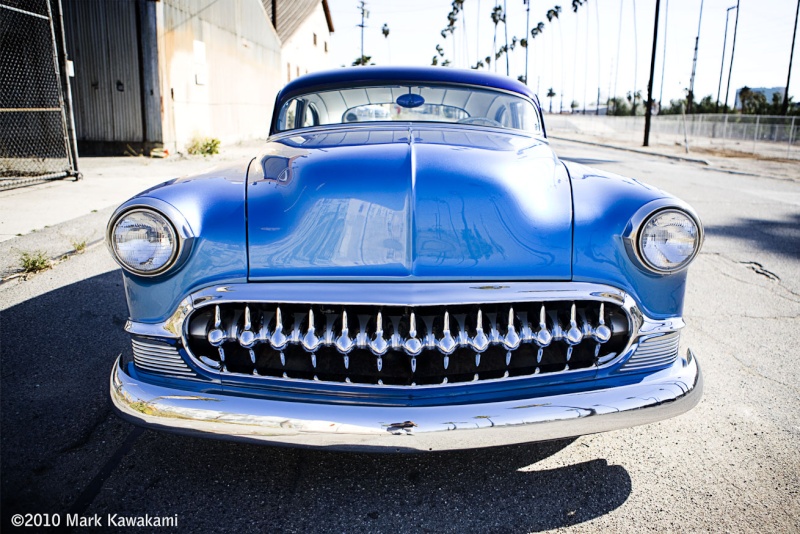
JAC: Who contributed to the build?
Rob: Well, Andre did the paint, I did a lot of the mechanical work on it with some friends, my friend Roger Starkey, down in San Diego, did the upholstery. He does upholstery out of his garage. You know it’s crazy, it’s the same deal as the paint. I had taken my car to one of the big name guys to get a quote, but they were to busy and they kept putting me off. In the meantime, Roger, saw my car online. We’re old friends. He’s in the car club the Deacons and he sent me an email saying he wanted to do my upholstery. It just happened the big shop couldn’t do it so I said fuck you guys and took it to him. He did an amazing job. Between him and Andre the car wouldn’t be what it is now.
JAC: Why did you decide to sell the car?
Rob: I didn’t. It’s no secret that I don’t make a lot of money being a magazine editor. We don’t make that much money. It has it’s perks, but we’re not going to get rich off doing what we are doing and I just needed the money. Well it didn’t sell when I had it advertised and just the other day I got an email from a builder in Colorado who had a customer looking for a car like mine. Not knowing I would sell and one thing led to another. I’m probably going to kick myself in the ass for it.
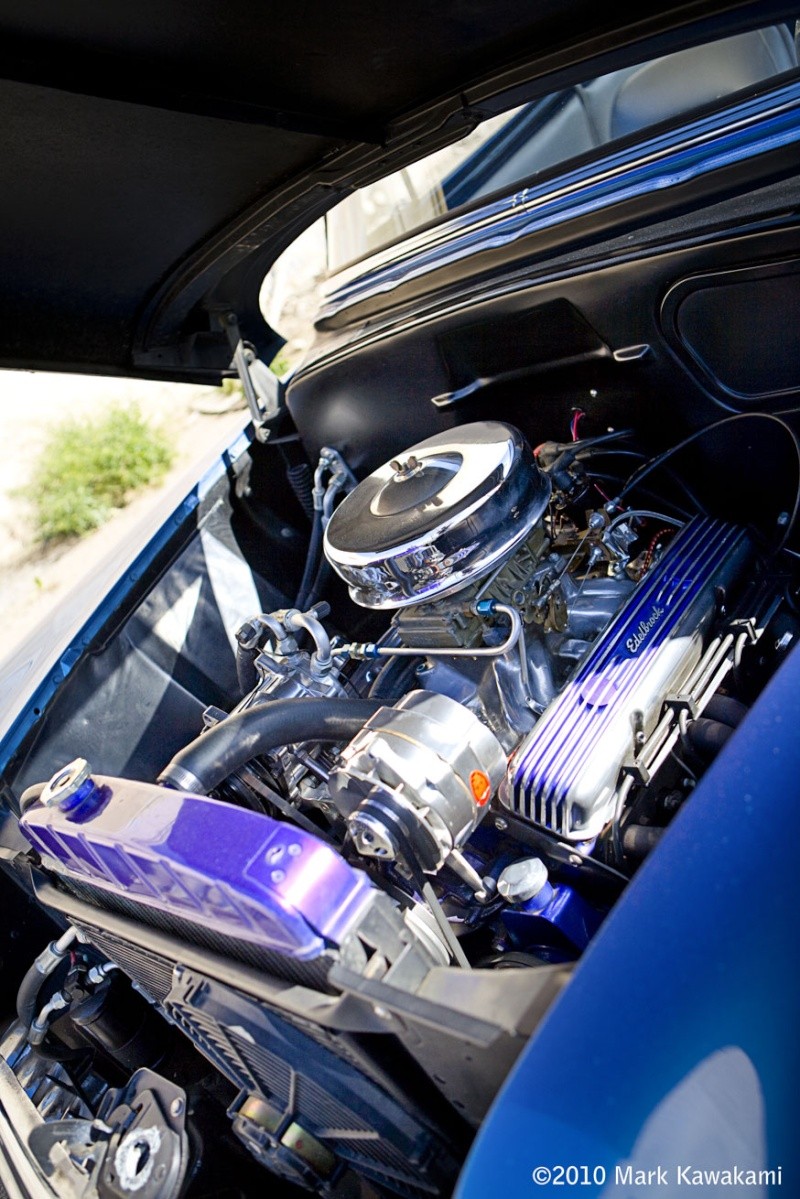
Rob: The influence was Cole Foster. His 54 is without a doubt the most outstanding Chevy ever built next to Moonglow. Cause Coop and I went to go see Cole (we drove the Shoebox Ford that he'd just bought from Keith Weesner) and he took us to Jason’s house and some other people houses, but I’ll never forget going to Todd’s house and seeing the car in the garage. It had that whole Salinas Boys look. Todd is out in Austin now and works at Austin Speed Shop. He was bummed that I sold it because he wanted to buy it back-but I saved the air cleaner that he handmade just for him...I just gotta remember to send it to him!

JAC: Who contributed to the build?
Rob: Well, Andre did the paint, I did a lot of the mechanical work on it with some friends, my friend Roger Starkey, down in San Diego, did the upholstery. He does upholstery out of his garage. You know it’s crazy, it’s the same deal as the paint. I had taken my car to one of the big name guys to get a quote, but they were to busy and they kept putting me off. In the meantime, Roger, saw my car online. We’re old friends. He’s in the car club the Deacons and he sent me an email saying he wanted to do my upholstery. It just happened the big shop couldn’t do it so I said fuck you guys and took it to him. He did an amazing job. Between him and Andre the car wouldn’t be what it is now.
JAC: Why did you decide to sell the car?
Rob: I didn’t. It’s no secret that I don’t make a lot of money being a magazine editor. We don’t make that much money. It has it’s perks, but we’re not going to get rich off doing what we are doing and I just needed the money. Well it didn’t sell when I had it advertised and just the other day I got an email from a builder in Colorado who had a customer looking for a car like mine. Not knowing I would sell and one thing led to another. I’m probably going to kick myself in the ass for it.

_________________
We don't care the People Says , Rock 'n' roll is here to stay - Danny & the Juniors - 1958
 Re: 1953 Chevy Bel Air - Rob Fortier
Re: 1953 Chevy Bel Air - Rob Fortier
JAC: How much are you going to miss the 53?
Rob: I don’t even want to think about it. A LOT. You know it was the first car that I ever finished to the point where I consider it done. I never had a car in a magazine, till this one. I never taken a car to Japan, till this one. I never got recognition for a car, till this one. So it’s not like selling a car, but selling a car I’ve become known for and I didn’t even build the car. I've never taken credit for it, ever. I’ve given credit where credit is due, but the car has become known as mine and it’s going to suck like hell to see it go. But in return I’m getting a pretty neat car out of it that I’m going to try and build in a similar fashion.
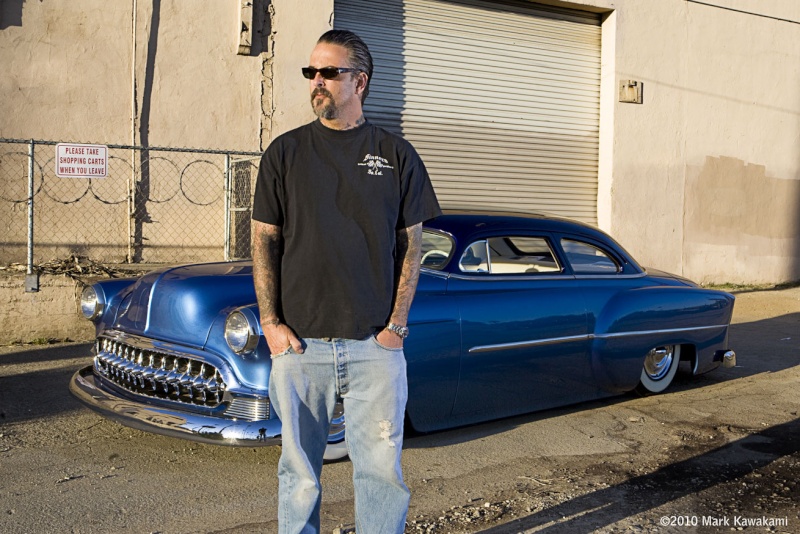
Tune in Friday for the second part of the interview where we talk about Rob, Magazines and rice.
JAC: Where were you born and raised?
Rob: Born in New York and raised in Riverside Ca.
JAC: When did you get into customs cars?
Rob: The 2nd grade. I don’t know how I inherited it because it’s not in the family at all. The closet my dad came to customizing a car is painting his dad’s car with a paint brush when he was seventeen. It just when I was in 2nd grade I started drawing hot rods out of the blue. I wish I still had some of those drawings, but yeah I was drawing cars with flames and stuff like that. It never really stuck with my mom that that’s what I would be doing down the road
JAC: What was your first custom you did?
Rob: 49 Ford Sedan Shoebox. Well I take that back. That was my first American custom car. Before that was Volkswagons. Jesse (James) and I would be doing Bugs back in school since we were fifteen. Been into VW’s since my last Bug was 90. So 90-91 I got that Shoebox and then it was no more Bugs.
JAC: So now that you sold your Bel Air what are your plans?
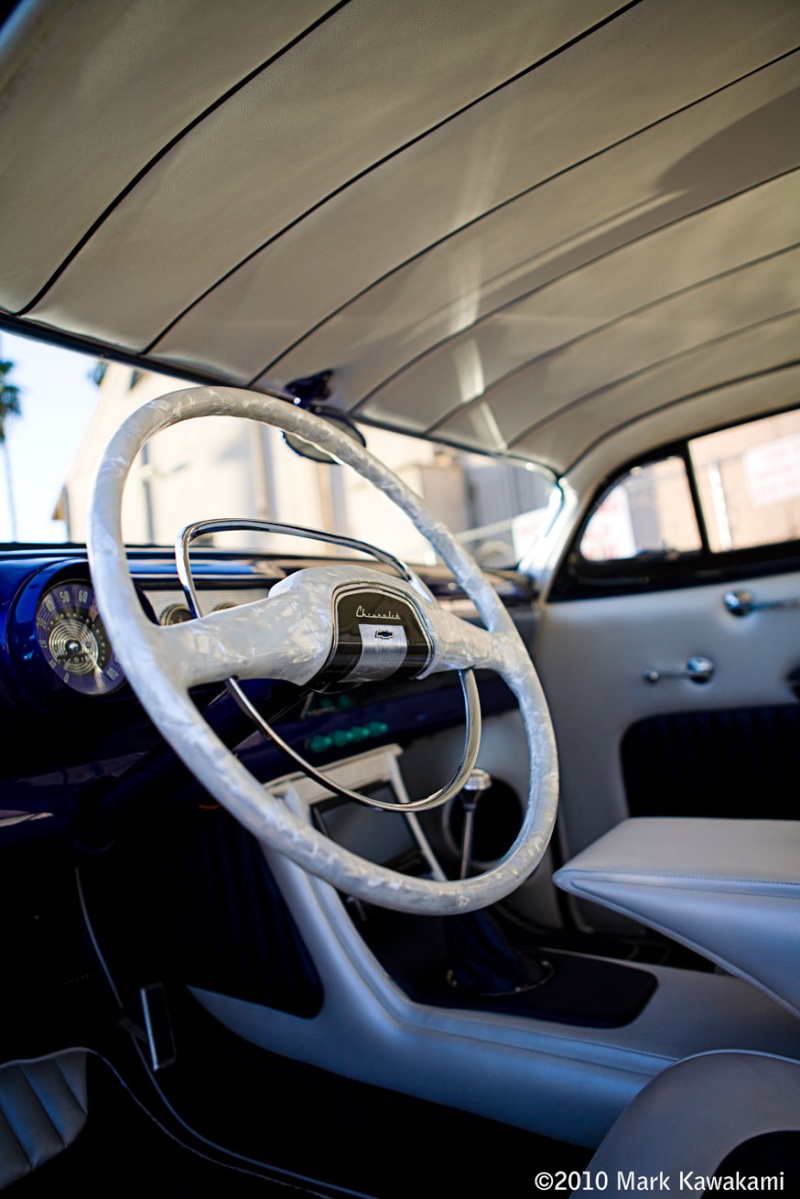
Rob: Well like I said part of the deal with the car is I’m getting a 47 Chevy Fleetline out of it. I’m gonna build that car and I want to do it better than the 53. I don’t know if that’s possible. I don’t have any talent building cars, but I do have a talent for designing them. That’s one thing I can take credit for is I got an eye for the look, colors and sort of overall design and style of a car. That’s what I’m hoping to do with this one and take this (Rob shows me a picture of the car on his cell phone.) and make that into the next beauty. In the meantime I have that exact same car but stock that I’m doing downtown. Another 47 Fleetline that I was building and my 39 Chevy truck that is at my house. Just move forward with those and get them done.
JAC: What do you prefer working on? Cars or Bikes.
Rob: Bikes are easier. They're not as back breaking. My last bike was a 66 Shovel. It was a Police Special. It’s in Japan now, but it may have come back. I sold it to Shige from Mooneyes. He’s got two of my bikes, the Shovel and my Panhead. I have a messed up back so it’s hard for me to ride. The Road King is not so hard on my back. It’s a good commuter bike.
JAC: How long have you been in the publication business?
Rob: Seventeen years. I started out at Street Rodder magazine. When I had that 49 Shoebox I got the job. Then I started working on Custom Rodder magazine and became the editor at Custom Rodder. Then they killed that magazine and I became editor at Classic Trucks magazine. Just about a year ago took over at Rod & Custom magazine. I’ve been with the same company for seventeen years.
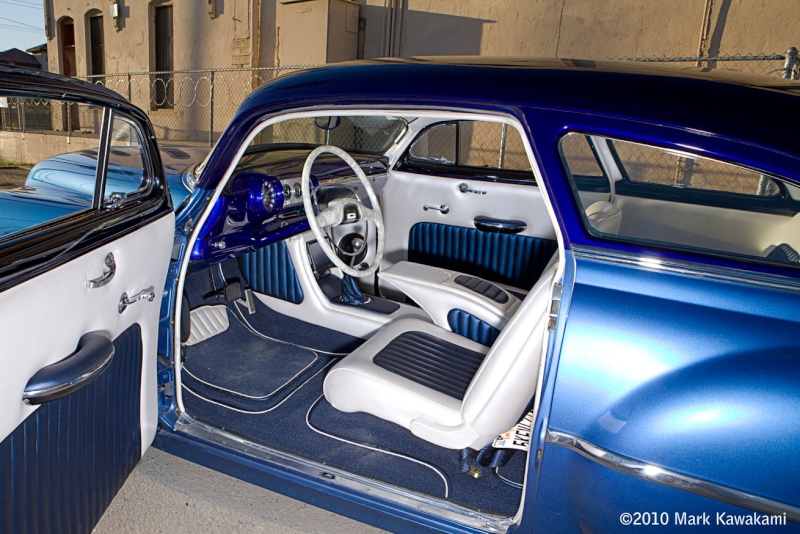
JAC: What does an editor do for a magazine?
Rob: Pretty much on a monthy basis organize each issue. Deal with the freelancers and deal with the people in house. Pick out the cover. Deal with all the advertising people. Put the whole magazine together pretty much.
JAC: So what do you think magazines need to do to survive the internet age?
Rob: I can’t speak for a magazine as a whole, but for a magazine like mine there will always be a need for a gearhead magazine. I don’t know about you, but I don’t want to read a magazine online. I can’t. I wanna go online for reference. If I’m looking for car pictures I want to have it in my hand. There will always be a need for it. It may not be a overwhelming demand but there will always be a need for it. The web will never engulf this type of magazine. Would you read my magazine on the iPad? You gotta dissect each type of magazine. Look at the readership. A hot rodder? Does he even own an iPad to begin with? Does he own an iPhone? He’s lucky if he even has a cell phone. We’re archaic and we’re going to stay that way to a certain extent. They’re not technological. They’re not into high tech gadgets. So they’re going to have to look at the magazines individually and say these guys “yes” and these guys “no”. I want to be part of the “no”, because I believe in magazines.
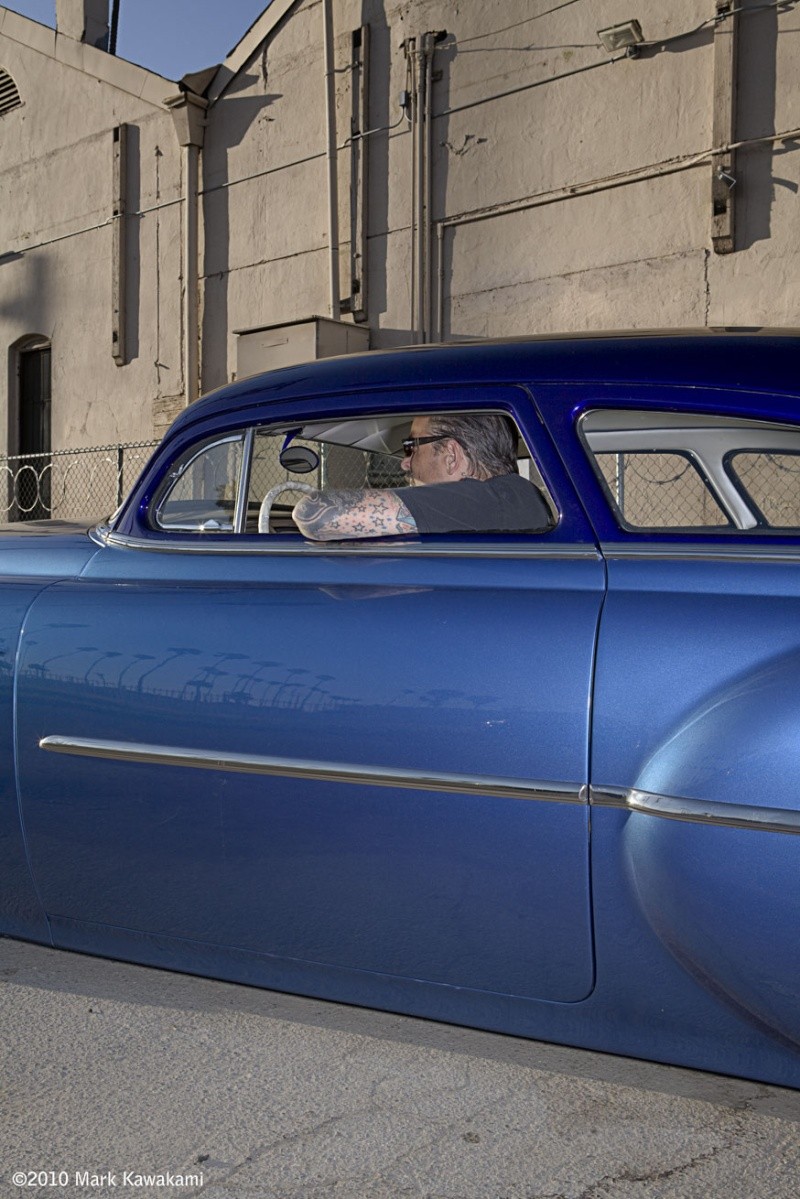
JAC: So what would be your dream car build?
Rob: I think I just sold it. Honestly. That car was a dream car. I bought it. I finished it. I now I fuckin’ sold it. But you know what? Life goes on. Despite the shortcomings I seen in the 53, that’s a pretty nice car. It turned out bitchin. I say, the “Next” one. The 47.
JAC: Who makes better rice, Nelson Kanno or Dave Park?
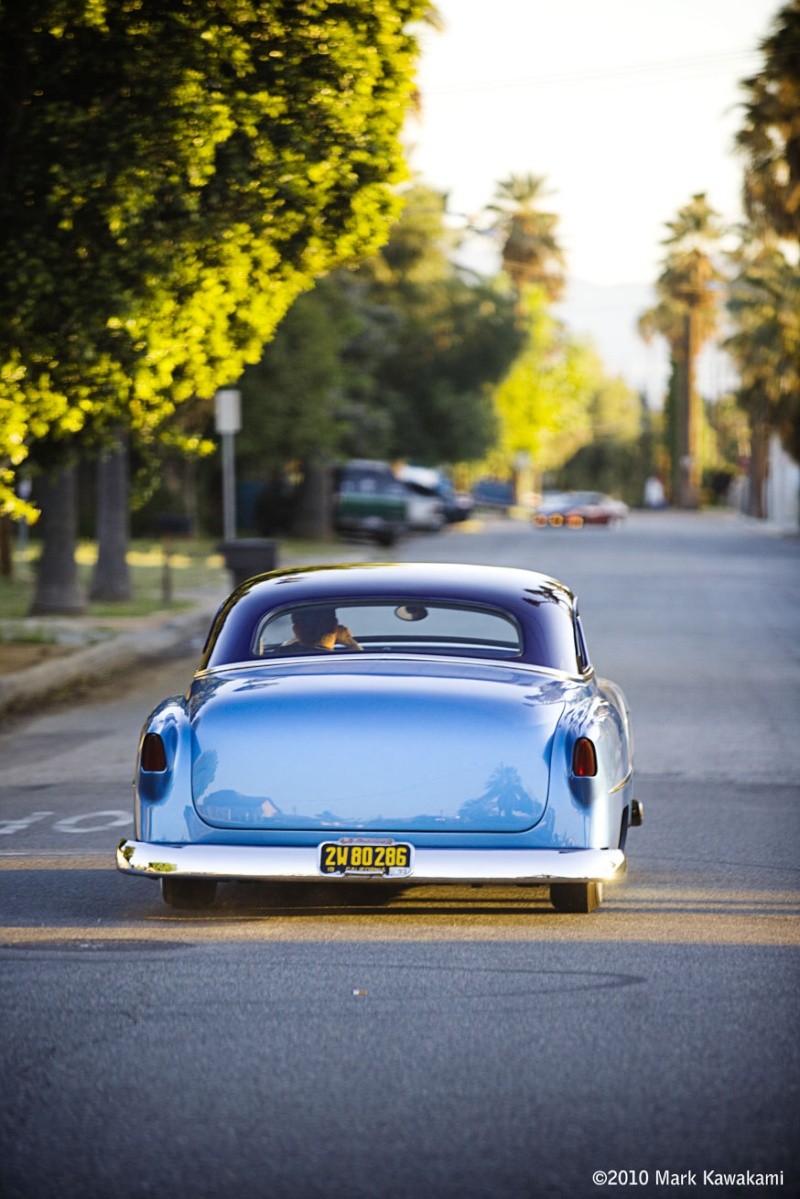
Rob: I never had either one of their rice, but I would imagine that Nelson is so anal that his rice would be better, but because Dave would know that I tasted Nelson’s rice so he would go out and buy rice from a restaurant and give it to me and say he made it
article original:
http://joyridesartco.blogspot.fr/2010/05/rob-fortier-interview-part-2.html
Rob: I don’t even want to think about it. A LOT. You know it was the first car that I ever finished to the point where I consider it done. I never had a car in a magazine, till this one. I never taken a car to Japan, till this one. I never got recognition for a car, till this one. So it’s not like selling a car, but selling a car I’ve become known for and I didn’t even build the car. I've never taken credit for it, ever. I’ve given credit where credit is due, but the car has become known as mine and it’s going to suck like hell to see it go. But in return I’m getting a pretty neat car out of it that I’m going to try and build in a similar fashion.

Tune in Friday for the second part of the interview where we talk about Rob, Magazines and rice.
JAC: Where were you born and raised?
Rob: Born in New York and raised in Riverside Ca.
JAC: When did you get into customs cars?
Rob: The 2nd grade. I don’t know how I inherited it because it’s not in the family at all. The closet my dad came to customizing a car is painting his dad’s car with a paint brush when he was seventeen. It just when I was in 2nd grade I started drawing hot rods out of the blue. I wish I still had some of those drawings, but yeah I was drawing cars with flames and stuff like that. It never really stuck with my mom that that’s what I would be doing down the road
JAC: What was your first custom you did?
Rob: 49 Ford Sedan Shoebox. Well I take that back. That was my first American custom car. Before that was Volkswagons. Jesse (James) and I would be doing Bugs back in school since we were fifteen. Been into VW’s since my last Bug was 90. So 90-91 I got that Shoebox and then it was no more Bugs.
JAC: So now that you sold your Bel Air what are your plans?

Rob: Well like I said part of the deal with the car is I’m getting a 47 Chevy Fleetline out of it. I’m gonna build that car and I want to do it better than the 53. I don’t know if that’s possible. I don’t have any talent building cars, but I do have a talent for designing them. That’s one thing I can take credit for is I got an eye for the look, colors and sort of overall design and style of a car. That’s what I’m hoping to do with this one and take this (Rob shows me a picture of the car on his cell phone.) and make that into the next beauty. In the meantime I have that exact same car but stock that I’m doing downtown. Another 47 Fleetline that I was building and my 39 Chevy truck that is at my house. Just move forward with those and get them done.
JAC: What do you prefer working on? Cars or Bikes.
Rob: Bikes are easier. They're not as back breaking. My last bike was a 66 Shovel. It was a Police Special. It’s in Japan now, but it may have come back. I sold it to Shige from Mooneyes. He’s got two of my bikes, the Shovel and my Panhead. I have a messed up back so it’s hard for me to ride. The Road King is not so hard on my back. It’s a good commuter bike.
JAC: How long have you been in the publication business?
Rob: Seventeen years. I started out at Street Rodder magazine. When I had that 49 Shoebox I got the job. Then I started working on Custom Rodder magazine and became the editor at Custom Rodder. Then they killed that magazine and I became editor at Classic Trucks magazine. Just about a year ago took over at Rod & Custom magazine. I’ve been with the same company for seventeen years.

JAC: What does an editor do for a magazine?
Rob: Pretty much on a monthy basis organize each issue. Deal with the freelancers and deal with the people in house. Pick out the cover. Deal with all the advertising people. Put the whole magazine together pretty much.
JAC: So what do you think magazines need to do to survive the internet age?
Rob: I can’t speak for a magazine as a whole, but for a magazine like mine there will always be a need for a gearhead magazine. I don’t know about you, but I don’t want to read a magazine online. I can’t. I wanna go online for reference. If I’m looking for car pictures I want to have it in my hand. There will always be a need for it. It may not be a overwhelming demand but there will always be a need for it. The web will never engulf this type of magazine. Would you read my magazine on the iPad? You gotta dissect each type of magazine. Look at the readership. A hot rodder? Does he even own an iPad to begin with? Does he own an iPhone? He’s lucky if he even has a cell phone. We’re archaic and we’re going to stay that way to a certain extent. They’re not technological. They’re not into high tech gadgets. So they’re going to have to look at the magazines individually and say these guys “yes” and these guys “no”. I want to be part of the “no”, because I believe in magazines.

JAC: So what would be your dream car build?
Rob: I think I just sold it. Honestly. That car was a dream car. I bought it. I finished it. I now I fuckin’ sold it. But you know what? Life goes on. Despite the shortcomings I seen in the 53, that’s a pretty nice car. It turned out bitchin. I say, the “Next” one. The 47.
JAC: Who makes better rice, Nelson Kanno or Dave Park?

Rob: I never had either one of their rice, but I would imagine that Nelson is so anal that his rice would be better, but because Dave would know that I tasted Nelson’s rice so he would go out and buy rice from a restaurant and give it to me and say he made it
article original:
http://joyridesartco.blogspot.fr/2010/05/rob-fortier-interview-part-2.html
_________________
We don't care the People Says , Rock 'n' roll is here to stay - Danny & the Juniors - 1958
 Sujets similaires
Sujets similaires» Chevy 1953 - 1954 custom & mild custom galerie
» 1953 Chevy Pick Up - Jim Thompson
» 1953 Chevy - Art Sierra
» Chevy Pick up 1947 - 1954 custom & mild custom
» 1953 Chevy custom - Joe Fritz
» 1953 Chevy Pick Up - Jim Thompson
» 1953 Chevy - Art Sierra
» Chevy Pick up 1947 - 1954 custom & mild custom
» 1953 Chevy custom - Joe Fritz
Traditional Kustom Hot Rod and Vintage Culture and design :: Mild & radical Custom cars database :: Chevrolet
Page 1 sur 1
Permission de ce forum:
Vous ne pouvez pas répondre aux sujets dans ce forum
 Connexion
Connexion
